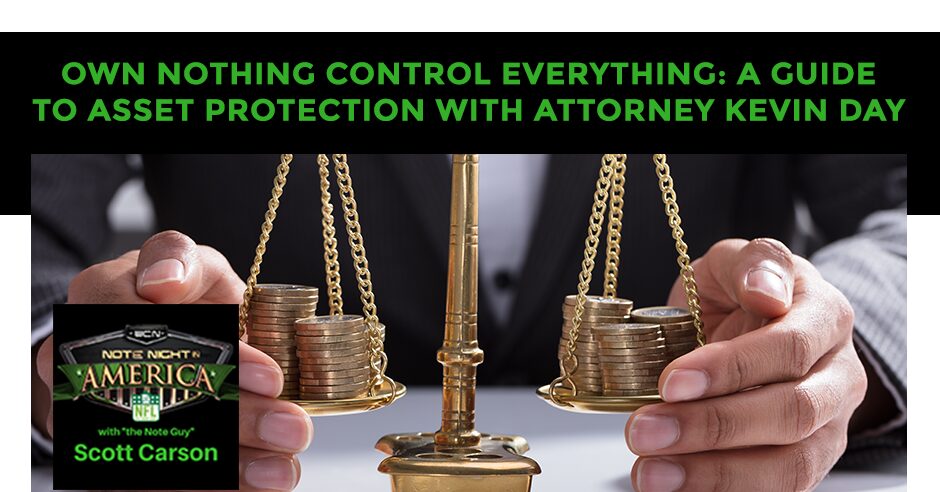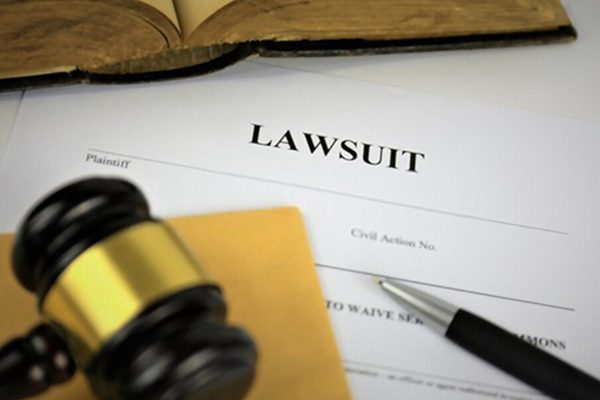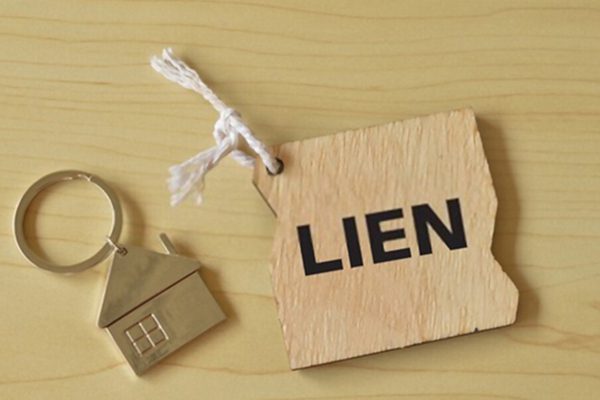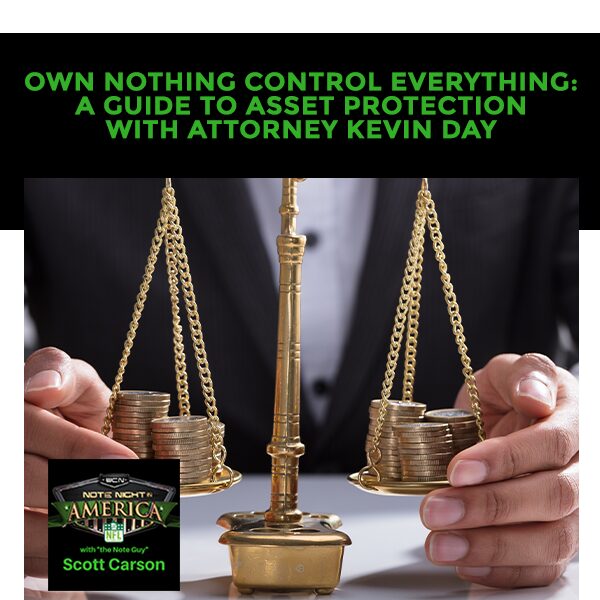
A lawsuit can be a crippling event that can stop your business dead in its tracks. Business owners need asset protection in the off chance of a lawsuit being filed against them. In this episode, Scott Carson talks with asset protection expert and attorney, Kevin Day, JD, MBA about some of the best ways for people to structure their entities and companies to avoid losing them in a lawsuit. Kevin shares several tips to protect your assets and shares insights on state laws. Learn more about asset and lawsuit protection by tuning in to this special episode.
—
Watch the episode here
Listen to the podcast here
Own Nothing Control Everything: A Guide To Asset Protection With Attorney Kevin Day
We deal with so many different things in the note business. You guys are buying distressed notes, real estate, working those out, and fixing rehabs. We are all dealing with a variety of issues. You’re raising capital. You’re trying to make sure your investors are happy. You’re not trying to get sued. You’re trying to make things going. You’re suing borrowers. You’re going through foreclosures, but then you have other regulatory entities.
You’ve got investors that can be happy or sad. They don’t get sad. Sometimes they get mad no matter what, but you have to work hard to protect your investment. I love this quote. If you can tell who’s behind it, John Rockefeller, a very wealthy and wise man, is rumored to have whispered on his deathbed to his son, “Own nothing but control everything.” That’s the magic. If you’ve got great asset protection, you’ve got great protection in how you structure assets, and I’m so jacked up for this episode. It’s been a while since we’ve done asset protection.

Asset Protection: Every entrepreneur really doesn’t earn their stripes until they have some kind of legal event and hopefully they’re small.
I have a special guest on. This guy on here has been a previous speaker on the show. I saw him again in Denver at Aaron Young’s Event. This guy is not only an amazing individual with a big heart for working with entrepreneurs and business owners across the county. He is one of the most knowledgeable individuals in his field. I’m glad to call him a friend. One time I’ve flown directly to San Diego, not to speak, but to ask him a couple of questions about different things and fly back.
This is a guy who is extremely knowledgeable. How many of you probably have a couple of different LLCs? You probably got real estate in either 1 or 2 states, maybe dealing with a business and real estate. I know that we all have our fingers in different buckets there. Our special guest is an asset protection expert, offshore trust, living trusts, irrevocable trusts. You name it. This guy knows how to do it.
A lot of times, we work so hard in what we do to acquire wealth and assets. It’s a shame when you don’t do that final step to protect your assets from ne’er-do-wells or people that are out to get you. He has been an attorney for many years. It’s hard to believe that he started when he was like five years old. Some of you guys know Aaron Young from Laughlin Associates. He is an inner circle member and advisor at all the Magnify Your Wealth Summits.
It was funny when I wrote the email going out about it, our mutual good friend, Aaron Young said, “Am I speaking to that?” “It’s not you. It’s our buddy.” He’s like, “That makes all the sense in the world.” It was funny that Aaron called me. He is one of the major players at Tresp, Day & Associates. He is an amazing individual guy with a huge heart and knowledge. He’s the one guy you want to have on your team when you’re in a back alley fight or in a courtroom, somebody who helps set up things to make sure that everything’s protected for you. He is Kevin Day and he calls San Diego, California, home. Kevin, I’m honored to have you on here.
One of the things from a lawsuit protection point of view is different people need different levels. Do you need a little garden fence to keep the neighbor boy from going through your rose bushes or do you need moats, walls, or something that fires back? We can do it all. Not only do you pay attention on how to build wealth, but that’s a lot more fun. Doing something proactive to keep your wealth is not as fun.
Once you have seen a friend go down in flames over some ridiculous lawsuit or you’ve had some little thing that insurance covers. Every entrepreneur doesn’t earn their stripes until they have some legal event. Hopefully, they’re small. You realize how easy it is over nothing to have a lawsuit start that gets bigger than it ever should. Our job is to build picket fences if you need picket fences or great big towers if you need big towers.
Why don’t we start off what you recommend people leaving that job going off into the amazing world of entrepreneurship and buying assets, property or real estate? Are there things that you suggest people initially set up or start working towards? Aaron always talks about starting with the end in mind. Many of us don’t know what that end is going to be, but starting off to get things rocking and rolling in the right path.

Asset Protection: Different people need different levels of lawsuit protection.
We’ll get to the end, so you have the end in mind. The starting point is having LLCs. You don’t want to go overboard. Anybody who’s talked to a lawyer, talked to other investors that have talked to their lawyers, whether you talk to a corporate lawyer, estate planning lawyer or real estate lawyer, and you say, “I want lawsuit protection,” they’ll go, “How many properties do you have plus your home? You need seven LLCs.” That’s the end of the story.
There isn’t anything else for them to do because they don’t realize this is a very specialized area of law, lawsuit protection, and there is a lot more to be offered structurally and with a strategy that isn’t present. That allows you to streamline a bit. If you have a property in California or a few properties in California, you’ll want a dedicated LLC for that. If you have a couple in Michigan and Alabama, you can use a little Wyoming company to hold several of those.
We look at each client individually, but having a real estate holding company, at least one to start piling. Your home is your castle, for most people, not all people. You want to get this real business property away from you. We like to say you can put four or so single-family residences in one LLC if you have a multi-door place, that usually warrants having its LLC for that. You want to segregate because there is too much ingress and egress. There’s too much activity.
One of the questions I get is as we’re teaching investors like, “I have an old LLC. I have an LLC with my business. Can I buy it in my existing business name?” You already give away what you feel like that. Talk about how that’s not good to do.
Information is power. When somebody wants to sue you, you often don’t know that they’ve decided that they’re going to sue you and they’ve gone to a lawyer. They start to do asset searches. Nevada is our place of choice, but there are other privacy jurisdictions. If you’re using Nevada or Wyoming, there is a handful of them where your name does not legally have to go in the public record, even though you’re the legal owner or the legal manager. Some states require the owner and the manager to be listed.
Privacy states like Nevada do not require the owner to be listed but do require a manager to be listed. You can use a nominee, officer and director, which means a hired gun or you can use a privacy trust, which we use to get your name out of the public record. Therefore, when you put your properties in there, they don’t see Kevin Day. They’ll see John Smith is the manager and presumptively, usually small companies, if it’s not IBM, if you’re a manager, you’re at least a part-owner, if not the complete owner.
If somebody is gunning for me, they’re not going to find my name associated with the companies that own my properties. Let’s say they know you own this property. They’re suing you because they got harmed on that property. They don’t know the other properties that you own because your name is not going to show up with that.
They can go back in the chain of title and still see that my name is in the property. If you’re signing on behalf or if they’re using something else, do you want to talk about that, Kevin?
There are two things. One, we like to start with a new purchase going directly in the LLC. If you have properties already, which a majority of people coming to us, they come to us through their lawyers or CPAs or somebody like you with Note Night. They say, “Why didn’t I hear about these strategies before I’ve got MBAs or lawyers on staff? I’ve never heard of this stuff.”
This is not uncommon. You’re coming to the game and say, “What do I do? I want to keep these properties. They’re good.” They can but they don’t know whether you sold the property or there is some other transaction or there are other investors that will foil their ability to get to the property, get to blackmail you.
The biggest thing that all of you should remember is that less than 1% of cases go to trial. If a case is filed a fraction of a minute, we’ve got hundreds and thousands of cases going on and they’re all settling. They settle out early if they don’t feel that they can get more than insurance money. They settle early if they feel like their case is on the rocks a bit.
They wait to the proverbial courtroom steps. If you have lots of property, why settle early? Make them sweat. Make the spouses at each other’s throats. They are not getting good sleep. They’re not running their businesses. Lawsuits are horrible. Even if you’re on the winning-hand side, they are so stressful. They are not something you want to wish on anybody except your enemies.
We make it look like you may have sold it and they can’t ask the right questions to find out. I stayed on as a manager. You say, “I got a sweet deal. I was able to sell.” We had a woman that had a complex and she sold it. We made the company look like it was a Chinese name. She said, “I got this sweet deal. Now I’m the manager on the property. I got such an eye-opening of people would share with me what was going on in the complex that they didn’t share with me when I was the owner.” There are little games that you can play. They can go back and find that you did own it.
We’re ultimately going to get to lawsuit proof trust, an irrevocable trust. That’s where real lawsuit protection comes in. Companies segregate the eggs into different baskets. If somebody sues on one property, they don’t get your home and your other savings. If you get sued personally, which they almost always do, they try to bring you into it. They try to pierce the corporate veil, but it might not do with the properties. There was a car accident one time, a car hitting a motorcycle. It was one person damaged. There was a $46 million judgment given to that one person here in California. You don’t have enough insurance for that. They are going to take everything you own. They’re going to ask you, “What do you own?”

Asset Protection: Lawsuits are horrible. Even if you’re on the winning side, they are so stressful. They’re not something you want to wish on anybody except your enemies.
“Do you own any real property?” You’re able to say legally under penalty of perjury, “I don’t own any property.” “Do you own any notes? Does anybody owe you money?” “No.” “Do you own any LLCs?” “Yes. My LLCs own notes and own real property.” They’ll come down and you usually think of my tenants, my investors. Those are my liability. You don’t think, “I’m a safe driver. I’m not going to have a problem. They’re not going to be able to pierce the corporate veil.” We don’t want to rely on that. To get to that point, you want an irrevocable trust because an irrevocable trust is an ultimate owner.
Corporations, LLCs, limited partners are separate people from you. The law, the corporation’s code, the IRS code says that you have to interact with that company as if Kevin Day or Scott Carson owned that company, which we’re going to take advantage of. The formality is there as if it’s not you, but it’s not an ultimate owner. A company can be owned by shareholders, members, partners. A company can own an LLC. That LLC is owned by another LLC, Corp. It can only end in two things, a human, no one owns you. No one owns an irrevocable trust.
While you drive cars and enter into contracts, you said something at the cocktail party about the business investment. You can get sued. Irrevocable trusts, if they only do business with you, you’re not going to sue yourself. We can put them up on the shelf, owning the valuable wealth of your estate and have them truly be lawsuit protected from any future creditors and most likely past creditors that you might not have known about but already had a relationship with. They’re going to ultimately say, “What do you own?” You list what you own. You don’t list what your company has. Even though they see you in the chain of ownership, you’re legally able to say, “I don’t own that anymore,” and it would be the truth and you’re not perjuring yourself.
That’s the thing about layering and protecting yourself. We’ve heard Aaron Young before talking about how to avoid breaking that corporate veil, make sure everything stays clean, and document things. You took the word, “You are not the corporation. The corporation is not you.” The documentation through the corporate veil protection. Let’s dive into that.
I know it’s different for everybody, but if you had a magical number of assets and stuff like that, people need to up their game to an irrevocable trust. What are you seeing? Is there a tipping point where it makes a lot of sense? It makes sense from the get-go, especially with growing things. You want to have that stuff in place ahead of time versus trying to go back and fix everything.
I’ll talk about the prices. Offshore trusts are very expensive. We haven’t talked about them yet. They’re legal because the US signed the Hague Convention on Trust. They’re recognized in all 50 states and it removes US court jurisdiction over the trust and its assets, so they would have to sue in Seychelles, Cook Islands or the Isle of Man, wherever we were forming that trust. They’re not inexpensive. We’re talking anywhere from about $18,000 up to $48,000, depending on the jurisdiction. If the mean is around $25,000, you have to have a sizeable estate or a high liability business.
We’re usually not talking about offshore trusts. If somebody is at $4 million, we’re going to say, “You need to try these on for size. You need to know everything about it because you should be getting it.” What we’ve found is when people are at about $3 million, maybe a bit less, but at $3 million, all your creature comforts are taken care of. Now you have disposable money and then you start getting that money deployed to make money, so you’re not pushing the ball. That’s all of you. You know that scenario.
A lot of you are cresting over and saying, “I’ve gotten to the point where my creature comforts are taken care of and I’m making sure my money makes more money for me than I make pushing the ball.” You don’t want to start all over when you’re at $3.5 million or so. Offshore should be very seriously considered. For anybody that’s under $1.5 million, a domestic trust is applicable. Those people between $1.5 million and $3.5 million, that’s where you have to assess how quickly are you growing? How much liability do you have? Try it on for size, but you’re probably domestic will be fine. Figure it out.
If you’re under $1.5 million, a domestic trust is appropriate. The question is, “When do I make that jump from having companies to a trust?” That’s hard. An irrevocable domestic trust, a copycat trust of the offshore where you can name yourself as a beneficiary but have legal deniability and have an ultimate owner to put all your goodies in. That cost is a little under $10,000. We have people with little coffee carts that say $8,000, $10,000. That’s cheap insurance. I can go ahead and do that. I can’t get enough insurance and have one bad night of E. coli. I’m wiped out. They’re taking my home. They’re taking my coffee cart, which is my living.
We can send a white paper out that can educate people on how these work, but only you can tell. If somebody’s at $200,000, companies are going to be the appropriate thing. When you start to get to $500,000, but you’re taking other investors, if you’re investing your money, you can get people that you’re taking notes from off then they’re in a bad place. They’re angry at everybody. They’re angry at you, especially if the money stops the flow. When you’re taking other people’s money, even if you’re smaller, you might want to do the domestic structure.
One of the steps that are a bridge between the two is getting a little Nevada company that doesn’t have anything to do with holding properties or notes we want to put in it. We make a little piggy bank company that only holds zero liability assets and puts liens against your home. That’s the Rockefeller strategy that we work with Laughlin. That’s very powerful. You can do that with or without a trust owning it. With the end in mind, you want an irrevocable trust owning that piggy bank company in Nevada.

Asset Protection: Everybody’s heard of Delaware as being for corporations. They’re really for a monolithic companies, companies that are public.
What’s a zero asset? Can you explain?
Cash, portfolio and notes. You might’ve purchased the note, but you sold it. You’re still involved as a broker and that’s why you’re still involved with investors or the person you’re holding the note from. That’s cash. If somebody sues you, they truly don’t, unless they’re suing you about the property. They don’t want property. They don’t want a business. They don’t want your home. They have to resell it. They’re liable for it in the meantime. Cash, portfolio and notes are zero liability in and of themselves.
You gave different numbers on there. You’re talking about asset levels that you own and control with those $1 million, $1.5 million and $3.5 million. If somebody is raising a lot of capital and they put a private placement memorandum together to go out and invest in things, and it’s an LLC or an S corp or C corp, would that number of money that you’re investing go to that number as well?
If you’re taking other people’s money, there is an incredible amount of liability. You’ve not only got the liability of people, but if they start to have failure somewhere else in their world, it’s the proverbial thing that lifeguards always approach with something between them and the person that’s drowning. They are so panicked that they’ll climb on the back of the lifeguard, saving them and drowning both of them. They start scratching and kicking everything and anything because something went wrong in their life. They want to get their money back.
You’re saying, “You signed up for this time. We’re wrapped up in this deal until we can get this and this done.” Taking other people’s money, you’ve got the liability of the investor and you also have a certain amount of government regulation and oversight. Both of those are super high liabilities. That’s where creating that Nevada company with a little domestic asset protection trust to be a separate owner and put liens on all the equity of your personal real property. We’ve protected the asset if something goes wrong, your main estate. It’s not in the number of your estate.
I’ve got 28 people working at our firm, which is medium to large for San Diego. I started with $500 in a fusion suite. If somebody doesn’t know what a fusion suite is, it’s where you rent an office and you share the copper, receptionist, and conference room. I was able to get so much business that I had people that had attorneys that had staff and staff attorneys working for them that couldn’t get business. I was the Dean of Students before I practiced law.
I was on the International Affairs Board for the City of San Diego. I knew a lot of people. They were coming and picking up cases from me and working them. I’ve started down at the beginning. My dad was a sixth-grade school teacher. I’ve made my little and empire here. I know every dollar is precious. We have to make sure that we make a structure that fits the budget but also have a game plan of where we want to go.
Iris is asking a question, “How do you feel about having your assets in an LLC initially?” Iris, are you mentioning your home, car or an IRA LLC for a lot of retirement accounts that some people are using? Can you make it a bit more specific or Kevin, is that enough for you to answer from?
Trust by itself is not a business tool. You don’t do business through trust. The Getty’s and some do it through trust. It’s a bit of a red flag if you’re doing business through a trust. We’ll always have the underlying company. The LLC will be the initial. It depends on how you’ve configured it. It’s all going to be different, but I’m going to invent. Somebody that has 1 or 2 single-family residences themselves. They also have the note business and then they have their home and savings. What we want to do is if they’re saying, “The trust is too expensive, but what can I do right now?”
That might be too much, but in an academic sense, we could get away with two companies because notes are zero liability. One would be a privacy company in Nevada that would hold your cash and portfolio and put liens against your home and the LLC that holds your two rental properties in our example. If somebody looks at you, they see Bank of America first and Golden Mountain Funding, a private lender in Nevada that has the second, you’re a turnip. Why are we going to bring the case?
We’ll fire across and see if there’s some insurance. I’m not going to try to rake you over the coals. Contingency fee attorneys aren’t going to take that case. They’re a business partner. They want money at the end of the rainbow. They don’t want just to win. The note business is different than your interest in the note itself. That’s why I was thinking of three companies. If you’re just in the note business and don’t have any of your rentals, then back down to two companies.
You would over encumber your personal home. You wouldn’t necessarily go out there and put it in an LLC initially, would you?
You have certain write-offs and stuff that you get to your personal residence. I want to be clear when we say that we encumber it. We don’t encumber it to Bank of America. We encumber it to your own little private piggy bank that nobody knows is owned by you.
We’ve used that strategy a lot for REOs or foreclosure. There are people out there in the world, ne’er-do-wellers, that track foreclosure auctions. A foreclosure auction technically wipes off the liens of a property. People are going out and slapping liens for $9,000 or $10,000, hoping that you’ll pay that off versus foreclosing space with a fraudulent lien. It’s been the big thing.
If you’re taking a property back, a foreclosure, over-encumber the property so that if you have a bad rehab or somebody can’t come and sue you for that, you’ve got your attorney with an LLC in a first lien or second lien position can bring the equity to put that in a third lien position. You can have your attorney do a friendly foreclosure to wipe out that third lien.
You want to be senior to any mechanic liens or stuff as you’re repairing your house, too.
Ron asks, “One LLC owning many nested LLCs is a bad idea. They shouldn’t be broken up until you’re over $3.5 million to $4 million.” I think Ron’s referring to like a series LLC.

Asset Protection: If you end up going public, you can always transition and merge into a newly formed Delaware company and you’ll be fine. But most entrepreneurs want someplace like Nevada.
If you have a series, some states respect them and some don’t. They’re one big LLC that has some accounting functions that are segregated. Other states do respect them as separate LLCs. You’re giving up too much information because the way series work, they’re all named the same with a series number usually behind it. Series are good, particularly if you own a lot of properties because they allow you to do all the accounting in one house, even though you’re collecting money from all the different series. I can’t black and white say, “Don’t use those.”
If you have a holding company and several LLCs, typically the way people do that, they’ll get single-family residences. They’ll get a couple of note businesses going, and then they’ll say, “I’ve gotten complex.” They’ll add a holding company. That’s very classic because it streamlines the administration. You still don’t have the segregation of the high liability assets from the lower liability assets versus tenants versus investors are very different profiles. At some point, it’s more important to add that trust than a bunch of companies. It’s hard to ascertain.
That’s where a personal consultation comes in, where we can look at your facts, your trajectory. How long have you been doing this? Are you a freshman? We want to go slower. You do want to go slower, even though we might have the perfect answer. Let’s use that answer as a roadmap. We do roadmaps. They’re $350, where we’ll collect all your information and say, “This is how you’re configured right now. This is the way we think is optimal. Here’s the interim step if you want to budget for it and build in the right direction.”
It’s a bargain if you’re planning on buying a lot of real estate and notes. You’re doing a lot of different individual transactions and buying different assets.
It doesn’t cover our time. It makes sure that we cover our attorneys that are working on it. It’s to make sure that we get serious that want to attend their estate and see what options are open.
Your time is valuable. You want to be dealing with serious people, not tire-kickers out there. As we like to call them, the prize pigs that show up for everything it’s free.
We’ll still talk with any of your people. We’ll give a half-hour free, too. Even without a roadmap, we will spend time with you to get familiar with you and give you some ideas. If you want to roadmap it out and get some diagrams, and then we put the meter up.
We love Nevada and Wyoming, but do you want to talk about the difference between the two? Why do you prefer one to another one?
Wyoming is a wannabe, which isn’t necessarily a negative. We form companies in Wyoming all the time. They’re a bit less expensive to maintain. The cases that are brought there don’t have a history. Nevada is a tax haven overtly. Look at the Secretary of Corporations website, “Come here for privacy. Come here for tax savings.” They have decades of this and the courts are used to it. The court and judges have their own structuring to hold their properties away from their personal life and stuff like that.
When you get into other states, you might have a law that technically supports it, but the judge, they’re still human and they’re going, “Why does this person need this much privacy?” You don’t want them thinking that. You want to say, “This is a smart person that was using the law the way they should. Let’s get on with the case.”
The court history to go along with everything versus somebody who doesn’t have the history.
Everybody has heard of Delaware as being for corporations. They’re for monolithic companies, companies that are public. They don’t want owners to wag the dog because if I’m an owner of IBM, they don’t want me having any power. Nevada took Delaware business law as their base. Some of the cases still go back to Delaware. They gave the power back to the owners because they’re going after entrepreneurs, not the big companies. If you end up going public or whatever, you can always transition and merge into a newly formed Delaware company and you’ll be fine. Most entrepreneurs want someplace like Nevada.
Any suggestions for California residents where fees are $800 per entity, whether it’s a California LLC or any other type of LLC? Any advice? Any counsel?
The equity stripping strategy with, let’s say, an irrevocable trust owning your little piggy bank company in Nevada, or even if you don’t do the trust, you do that first step. The equity stripping is true lawsuit protection in the blackmail game of a lawsuit. They see the lien. That’s more important than segregation of assets because if you have four properties and they’re in four different LLCs and somebody sues you because of premises liability, they will take that property.
If there is a senior lien, there isn’t anything to foreclose on. An asset isn’t an asset if there is no equity in it. We can have one California company with seventeen properties in it and an equity strip, so there is no equity, at least as far as the public record is concerned. That way, you keep your costs. You will have one California LLC, because it’s California dirt, but the equity stripping is going to be based on a different area of law and remove jurisdiction to Nevada.
You’re not on the LLC that they can search to try to tag you that $800?
There is an additional real exception, thanks to the big banks lobbying for us. Lending into California, for instance, under a line of credit. Let’s say, if you have $2 million or $1 million worth of property, you need to put a lien against $1 million, but you want your cash to use. This is your own money. You’re not borrowing from Bank of America. You’re pine tree lending. If you borrowed $5,000 from me, but I gave you a line of credit for $1 million, I’m going to lien the whole $1 million. Otherwise, you’d go out to Union Bank and then they get my security and then you call my note.
I’m going to put the whole lien for the $1 million. The whole world doesn’t see whether you borrowed $5,000, $500,000 or $1 million. They see the $1 million. Lending because of the banks and their lobbies is an exception to doing business in California. What it is renting dollars out of Nevada. They don’t see you there because you’re not in the public record, so they don’t know about it to bark up the tree anyway.
Do you have any advice for an LLC in New York City?
It’s the same thing. If you have property there, that’s Nevada dirt. You’re putting liens against the property is the way to go. If you’re operating with investors, you want to have at least one LLC for that, where you’re doing business. If your investors are outside of New York, why do you want a New York LLC like you wouldn’t want to California LLC?
What about in Nevis or St. Kitts LLC?

Asset Protection: Putting liens against the property is the way to go. If you’re operating with investors, you want to at least have one LLC for where you’re doing business.
Doing Nevis or St. Kitts, it depends. Our firm form companies all over the world. St. Kitts, I wouldn’t put their one country, but they have different laws. Nevis would be the place to go. The British Virgin Islands is a good one. The Cook Islands. These little jurisdictions like British Virgin Islands or Nevis, they have a good law that protects undercharging order, but if you’re still the owner in a US court. If we have Nevis company and it’s owned even by a domestic trust, you’re not the owner anymore. You’ve got the legal deniability. If you’re the owner, the court here is going to be very displeased when you answer truthfully because you’re not going to perjure yourself. That’s a felony.
Ultimately, you’re going to say, “I own four companies, and one of them is in Nevis.” They’re going to say, “John Smith, who sued you, is now the new owner. Give him the share certificates.” It’s still going to invoke under the charging order rules going down there, but the court is going to start saying, “You’re not cooperating with the law.” When you have a trust, you’re able to say, “The law says, ‘Trust isn’t me.’ I’m sorry. The trustee isn’t getting it back to you.” That’s where trust come in handy. Nevis and British Virgin Island companies are very good.
How do you feel about decentralized, automized organizations being used as business formations in Wyoming? Are you seeing a rise of blockchain technology being used in businesses?
I know that a lot of people will put their wallets. They have their wallet. It’s like gold or silver. You might have custody, but if we’ve logged it in on an asset sheet owned by one of these companies that are owned by an irrevocable trust when they depose you and say, “What do you own? List everything you own so we can send the marshal out to foreclose on it or take it,” you don’t list the gold or the blockchain to a direct question. “Do you have any Bitcoin? Do you have any gold?” You can say legally no, even though it’s in your safe at home because we have done the formalities to make sure that it’s in the piggy bank company that’s owned by an irrevocable trust. You’re not the owner anymore.
What about the new FinCEN beneficial interest rules?
There are two different things. Getting away with tax issues and I’m not going to say tax evasion, tax avoidance, the legal one, are different strategies. We’re talking all tax-neutral here. We’re not trying to create something that we can. We have three tax attorneys on staff, but we’re talking about lawsuit protection. We’re not trying to hide anything from the government. We’re trying to hide it from lawyers and public record.
Interestingly enough, the IRS has something like an attorney-client privilege. It’s a privilege that people can’t get your tax returns and so forth, except under interesting circumstances. They were finding the company owners were lying on their tax returns, not to get away with taxes, but not allow somebody to sue them and get their taxes and then know their market share and what they were doing. Once that dawned on them, they said, “We’re not going to share tax information unless it’s in particular circumstances.”
That’s why the whole big thing about everybody wanting to see Trump’s tax returns and providing it because he didn’t need to. He didn’t want to let everybody know where everything was going. What happens upon your death? Who do you designate as the beneficiary of your trust in things?
Let’s say we’ve done a living trust for all the things in the public record, the things that are attached to you like your home and your high liability business. Your lightning rod for that, hopefully, they don’t pierce the corporate veil, but they know you’re associated with that because you’re the one that’s asked them. You keep that in your name. That should be in a living trust.
The irrevocable lawsuit-proof trust will have the same provision saying, “I don’t want my kids. I want a roof over their head. I want to send them to college. I don’t want them to have any money to do something stupid until they’re 25. I want them to go to the School of Hard Knocks before they get any money. Even then, we’re only going to give a quarter to them and then we’ll give them a little bit more. We will divorce-proof their inheritance. We’ll only give it to them as long as they keep it as sole and separate property.” All those things can be in a revocable living trust or in the lawsuit proof trust.
If you don’t have that second irrevocable trust, we want those ultimate LLC, the holding LLCs or the business LLCs in your name. You want in a living trust because you want to avoid probate. Some attorneys are going to get 6% of your estate. That means $26,000 per $500,000. That’s outrageous. Spend a few thousand dollars on a living trust, so your kids get that extra $50,000 instead of some attorney. We’re blue sky. We can do living trust in every state of the union.
It makes sense to talk about somebody who passed away. Everybody should still have a will that outlines with their personal belongings, but everything is already outlined in those trusts no matter what happens. Here is another question. “I’ve been thinking of setting up an LLC. Can you share Kevin’s Day information so I can talk to him on the review for a price?” You’re doing LLC, Kevin?
We form LLCs, advice on what states and why, whether it’s a privacy company or not a privacy company.
Any states you like? I won’t mention California for the fee or New York. Any states besides Nevada or anything like that with LLCs locally, especially if they like doing business in that one state?
Let’s say you have all of your properties in Alabama. We’re going to recommend that you have an Alabama LLC because liability can come from that. I can tell you horror stories. I don’t want to scare everybody. Owners who are doing all the right thing. An example that you heard, Scott, was this guy got a little apartment complex. It had a resident manager already with it. I forgot how many doors. The tenants were complaining and they’d never gotten the previous owner to put lights in the backyard because when the kids came home and it was still dark from school, they weren’t able to play outside.
Not only did he do the lights and back, he had the manager do them, also put up a little half-court so they could play basketball. Here is an owner doing more than he needed to. A ten-year-old put their hand on the chain-link fence and got electrocuted. The manager had used an unlicensed contractor, a handyman that had worked there forever. Anyway, luckily he was a client of ours and we had already done the structuring. They weren’t able to pierce the corporate veil, but they weren’t able to take the little apartment complex either because we had senior liens on it.
You want the right moral position to do the right thing by somebody that you’ve harmed, whether it’s intentional or not. You want the upper hand. You don’t want the court saying, “You have to pay $5 million more than that or we’re taking the apartment building. You will no longer have this that you’ve worked how many years to be able to afford that.” You’ll want the home-based company for operations and then the privacy company in someplace like Nevada.
Here’s another question. “I have a trucking company that’s going to have the most liability, but I also have properties in my corporation in Texas that I would like to keep as far away from the liability of the trucking company away.” Are they in there in your C corp? Is it a different corporation that owns your trucking company? I think it was probably the first question. Is it in the same LLC? Totally separate LLCs. The trucking company owns the properties as well.
Different people feel differently. People that are real estate investors and have been for years. Tenants will invent lawsuits. When they have a legitimate accident and see how easy it is to make a bit of money, they start looking for ways to create lawsuits. That being said, in my opinion, I do have quite a few clients that have trucking businesses. That’s a big tonnage rolling down the road. You want to keep that separate. That would be not a normal configuration, but for you, for instance, if we had a little domestic lawsuit protection trust, and we had your piggy bank company that owned your cash and portfolio and notes.
We would have your real estate LLC owned by that same trust, which we normally wouldn’t do because the trucking business is such high liability. We had a trucking company. Two little old ladies were coming back to California after gambling in Las Vegas. They decided they were too tired to drive and they pulled over at the bottom of a dip and didn’t quite pull all the way off the road. Our client’s truck came over the hill and saw it. Their lights were out and everything else and killed both ladies. Luckily, we had all the trucks encumbered with UCC-1, so we were able to keep it within insurance limits.
The corporation is the parent company of the trucking company.
You can do that. Piercing the corporate veil is real, but it doesn’t happen all the time. If you haven’t already, Scott will introduce you to Aaron Young, who, at a fraction of attorney’s costs, will do the paperwork to make sure that the corporate veil isn’t pierced. I would still work toward the end of separating those. That’s a better configuration. If a judge doesn’t like you and they do like the little grandma that you’ve harmed, they will go to their research attorney and say, “Find me one line in one case so I can find for the little grandma. I want to pierce this corporate veil. Find something that allows me to do that.”
Do you mean juice is not blind?
Don’t get me on my soapbox. You’ve seen it before. It’s a scary thing.
I’ve seen advertisements about how the insurance is. In the same situation where a trucking company hits or injures somebody, that’s no longer the company that can be sued. It’s the individual that was driving the truck. We’ve seen advertisements where they’re trying to push legislation. Do you have any opinion on that?
This is what I advise parents with teenage children that are starting to drive. Go buy some beater or whatever you’re going to buy but put it in their name because the law, the way it is now, they get to sue the owner. It was your machine that ran into them and it was the operator. They’re going to sue you and your child and the child doesn’t have any money. They’re taking your home and your businesses. If you’re going to buy a nicer car for them, still put it in their name and have them sign it back to you.
You put it in the safe so you can get the car back if they fall off the wagon and they’re a bad actor or whatever, which some teenagers become. You don’t want that car in your name. Insurance companies, you can call them up and say, “We have a new driver.” They don’t ask for the pink slip or anything else. You can still get a good rate for them, but you have the kid technically be the owner.
In California, somebody texted me a question about owning cannabis companies, whether it’s a dispensary or a grow house, along with real estate. Are you working with any clients working with that or buying houses or having a grow house or dispenser there in California? How do they structure those?
You want to separate. Even though it’s legal here in California, you never know what the government’s going to do, how it’s going to fall down, even though they’re laying silent. We want to protect. We’ve had a few things happen that we’ve been able to protect family homes and stuff like that, even though something went badly for clients on the cannabis side.
I pulled up your website there. Go into Contact Us for a consultation down there. Is that the best way you want people to contact you?
Yes. Your readers are from all over the country, so we can do it by Zoom. If you’re in the area, we’re in a little town called Solana Beach. It’s about 20, 30 minutes North of San Diego. Most people don’t know Solana Beach, but you’ve heard of Del Mar where the racetrack is. We’re the next lagoon North. We’d love to have you visit here, but we’ll do things over the phone or via Zoom to get your answers to you.
TrespDay.com is that website. Once again, congratulations. You guys have merged prior to COVID.

Asset Protection: When taking other people’s money, you’ve got the liability of the investor and you also have a certain amount of government regulation and oversight.
It’s been several years. We’re growing crazily. We hired two more litigators.
Any other things you want to talk about, Kevin, that you think our readers should know?
You want to take some action on this, even though it’s the boring side of being an entrepreneur. You’re either already an entrepreneur. Everybody here is an entrepreneur. Some of you know that you’re an entrepreneur, some of you don’t quite feel like you’re entrepreneurs, but you are. I love it. My job is X, Y, and Z, my W-2 and I have two properties. I’m not an entrepreneur. Guess what, you are. A bit of attention in this world of lawsuit protection, privacy and lowering your profile can be an incredible remedy if something happens. You can do it in a stepping stone fashion. We can help you look at where you are and where you want to be so you can devise a plan.
I remember the first time I heard you speak. It was in Lake Tahoe at an event. Steph and I looked at each other. As you were going through things, we were like, “We set up things so wrong.” It’s common for people to be like, “I set this stuff up.” You said it and then Aaron said, “It’s an onion. You’re going to layer it back in a bit of time. Nothing that you set up cannot be corrected.” Once again, TrespDay.com. If people are setting up the consultations, what are some important things they need to put together initially when talking with you or somebody on your staff?
If they already have entities, it would be good if they could draw little boxes and arrows. Let us know. We have a living trust. We don’t have a living trust, but we have a will. We have one company. We have three companies. What are in those companies? Boxes and arrows do speak 1,000 words and that will give us a great head start.
With everything being so chaotic this 2020 on the housing market, they’re finally coming to the end of the foreclosure moratorium and evictions. Do you foresee a few more lawsuits as people are either being evicted or foreclosed on or people are trying to go back after borrowers and things like that?
Unfortunately, my faith in the bad part of humanity says that will continue, even though, in my opinion, the housing has reversed the speed at which it’s coming back. It’s surprises the heck out of me. People are putting their houses on the market and they’re gone in five days. There’ll still be lawsuits, unfortunately.
If you’ve got a property with equity, you want to over-encumber it and make sure it’s protected in case it happens.
The problem with going to Bank of America to do that is then you have to say, “What do I do with the money I got?” That might be an appropriate business strategy, but usually, you don’t want to be hiding that money. You want a third-party private piggy bank doing that equity stripping.
If somebody has a self-directed IRA or a solo 401(k), what are things they should do to protect that?
401(k)s are particularly protected under ERISA a la OJ Simpson. The self-directed IRAs. It’s state by state, but IRAs are not completely protected, but they rarely, under public policy, will invade those.
Part of the reason he moved to Florida was also that the judgment unit couldn’t go through past his personal house, too, right?
Yeah. Texas and Florida are the only ones that’s do still have true homestead laws.
Thank you so much for coming on here. I know it’s unique for how and wherever everybody is at and what they have set up uniquely. Thanks for thinking to add some clarity to it. Once again, TrespDay.com, click on the Contact Us for consultation, and someone will be in contact with you from your office.
Thank you. Michelle Fischbein is the head of our lawsuit protection department. We have quite a few attorneys in there. She’ll most likely be the one responding. I travel too much. Scott, thank you for having me on Note Night. This was so much fun.
As always, we need to do this more often. We’ve already got you scheduled to speak on our Note Camp Convention as well, too. We’ve got a spot secured. Thank you again so much.
Thank you so much, Scott. Good seeing you again.
Thanks, Kevin. That’s going to wrap it up for this episode. Go out, take some action. Trust me. If you’re sitting there concerned, worried or stressed about things, do yourself a favor. Make a consultation. Talk with somebody. It’s always good to have a game plan and marching orders. What do you need to set up and what do you need to do? It’s not that complicated. It only becomes more complicated the more you sit in your mind and worry about the worst possible thing. Many years of history of Kevin plus his whole amazing team. You’re in good hands with Tresp, Day.
Important Links
About Kevin Day
 Kevin L. Day is one of the leading estate planning and international asset protection planning attorneys in the United States. Mr. Day’s Bachelor Degree is in Chinese Studies, and he holds both a Masters of Business Administration in International Management and Doctor of Jurisprudence degree. He was a university academic administrator for eight years, a law professor at the doctorate level and a law school Dean of Students, before going into private practice. In addition to his legal expertise, Mr. Day brings his extensive business knowledge as an MBA in International Business to his law practice.
Kevin L. Day is one of the leading estate planning and international asset protection planning attorneys in the United States. Mr. Day’s Bachelor Degree is in Chinese Studies, and he holds both a Masters of Business Administration in International Management and Doctor of Jurisprudence degree. He was a university academic administrator for eight years, a law professor at the doctorate level and a law school Dean of Students, before going into private practice. In addition to his legal expertise, Mr. Day brings his extensive business knowledge as an MBA in International Business to his law practice.Love the show? Subscribe, rate, review, and share!

